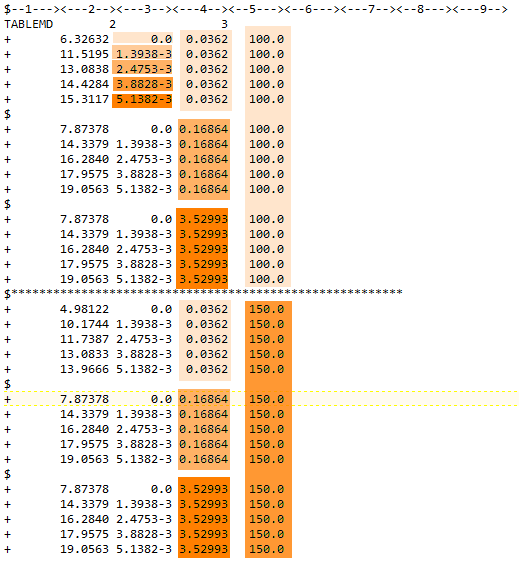TABLEMD
Bulk Data Entry Defines a multi-dimensional tabular function which identifies single or multiple X-values for a single Y-value.
Format
| (1) | (2) | (3) | (4) | (5) | (6) | (7) | (8) | (9) | (10) |
|---|---|---|---|---|---|---|---|---|---|
| TABLEMD | TID | LABEL | NDEP | FLAT | |||||
| Y1 | X1_1 | X1_2 | X1_3 | ... | ... | ... | X1_7 | ||
| X1_8 | ... | X1_10 | |||||||
| Y2 | X2_1 | X2_2 | X2_3 | ... | ... | ... | X2_7 | ||
| X2_8 | ... | X2_10 |
Example
| (1) | (2) | (3) | (4) | (5) | (6) | (7) | (8) | (9) | (10) |
|---|---|---|---|---|---|---|---|---|---|
| TABLEMD | 32 | 2 | |||||||
| 6.326 | 0.0 | 0.0362 | |||||||
| 11.5195 | 1.3933 | 0.0362 | |||||||
| 13.0838 | 2.4753 | 0.0362 |
Definitions
| Field | Contents | SI Unit Example |
|---|---|---|
| TID | Table identification
number. No default (Integer > 0) |
|
| LABEL |
|
|
| NDEP | Identifies the number of
dependencies (Xi_j) defined for each
Yi value. No default (Integer > 0 and ≤ 10) |
|
| Yi | Yi
values. No default (Real or ENDT) |
|
| Xi_j | Xi
values for each corresponding Yj value. 4, 5 No default (Real or ENDT) |
|
| FLAT | Specifies the handling
method for looking up Yi-values when specified
Xi is outside the range of
Xi-values in the table.
Default = 1 |
Comments
- At least one continuation entry must be specified.
- When TABLEMD is used in OSTTS damage calculations, NDEP=1 should be specified. The Xi_j values should be specified in ascending order only.
- String-based labels allow for easier visual identification of TABLEMD, including when being referenced by other entries (for instance, the TID field of material data like MATS1 and MATF entries). Refer to the String Label Based Input File for more information.
- For a particular Yi, if certain Xi_j fields are blank on the TABLEMD entry, the default value for such Xi_j is set as 0.0. The final Xi_j value defined for a particular Yi should not be left blank.
- The Xi_j values
should be in ascending order. Further, for each Xi_j, the
previous Xi-1_j column must be in ascending order.In Figure 1:
- We can see that X3_j = {100.0, 150.0}.
- Now, for X3_j = 100, the corresponding X2_j values are in ascending order; X2_j = {0.0362, 0.16864, 3.52993}.
- Similarly, for X2_j = 0.0362, the corresponding X1_j values are in ascending order; X1_j ={0.0, 1.3938-3, 2.4753-3, 3.8828-3, 5.1382-3}.

Figure 1.